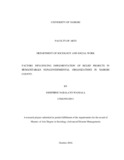| dc.contributor.author | Wanjala, Josephine N | |
| dc.date.accessioned | 2017-01-06T08:01:42Z | |
| dc.date.available | 2017-01-06T08:01:42Z | |
| dc.date.issued | 2016 | |
| dc.identifier.uri | http://hdl.handle.net/11295/99502 | |
| dc.description.abstract | This study sought to examine the factors influencing implementation of relief projects in humanitarian non-governmental organizations in Nairobi County. Specifically, to determine how management influence implementation of relief projects in humanitarian non-governmental organizations in Nairobi County, to establish the extent to which financial sustainability influences implementation of relief projects in humanitarian non-governmental organizations in Nairobi County, to investigate how regulatory framework influences implementation of relief projects in humanitarian non-governmental organizations in Nairobi County and to assess the extent to which stakeholder involvement influences implementation of relief projects in humanitarian non-governmental organizations in Nairobi County. The study adopted a descriptive research methodology and the target population of 190 registered humanitarian Non -Governmental Organizations which operate in Nairobi County was used. The sample size was 95 non-governmental organizations and data was collected using questionnaires and key informants guide. Data was then analyzed using statistical packages for social scientists software and presented using tables and percentages.
The study found out that majority of the respondents 80.8% consider strategic plans important tool in Project management in humanitarian non-governmental organizations while 19.2% think otherwise, majority of the respondents 87.1% said the non-governmental organizations had conducted feasibility studies prior to project implementation while only 12.9% had not done feasibility studies, majority of the respondents 91.1% were conversant with NGOs Co-ordination Act while 8.9% were not conversant with the Act and 75.6% of the respondents consider stakeholder participation an important aspect of project management while 24.4 percent do not consider it important. Humanitarian non-governmental organizations should be encouraged to establish accountability systems and put in place financial sustainability measures by establishing alternate sources of incomes. It is recommended that the Government should raise awareness on legal and regulatory framework among Humanitarian non-governmental organizations and put in place measures to ensure all Humanitarian non-governmental organizations obtain PIN numbers and tax exemption certificates from the revenue authority. Humanitarian non-governmental organizations should be encouraged to hold stakeholder meetings with project beneficiaries as this improves project implementation status in non-governmental organizations. The Government through the NGOs Co-ordination Board should put in place regulation that requires Humanitarian Non-governmental Organizations to have strategic plans and accountability structures as soon as they are registered. | en_US |
| dc.language.iso | en | en_US |
| dc.publisher | University of Nairobi | en_US |
| dc.rights | Attribution-NonCommercial-NoDerivs 3.0 United States | * |
| dc.rights.uri | http://creativecommons.org/licenses/by-nc-nd/3.0/us/ | * |
| dc.subject | Implementation of Relief Projects | en_US |
| dc.title | Factors Influencing Implementation of Relief Projects in Humanitarian Non-governmental Organizations in Nairobi County | en_US |
| dc.type | Thesis | en_US |



